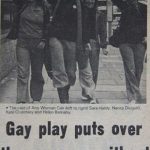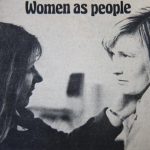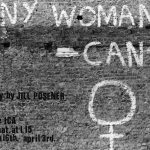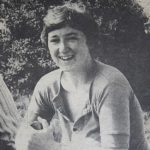Company Name: Gay Sweatshop Theatre Company
Writer: Jill Posener
Director: Kate Crutchley
Designer: Mary Moore
Cast: Brenda Addie, Helen Barnaby, Donna Champion, Kate Crutchley, Nancy Diuguid, Patricia Donovan, Vanessa Forsyth, Sandra Freeman, Patricia Garwood, Sara Hardy, Elizabeth Lindsay, Penelope Nice, Julie Parker
Year: 1976
Any Woman Can by Jill Posener. A tale of one woman’s pride and acceptance of her homosexuality.
First performed for one night at the Haymarket Theatre, Leicester with Miriam Margoyles in the central role. The director was Kate Crutchley. Kate Crutchley was in a relationship with the designer Mary Moore; both became long-term contributor’s to the company. After a successful application to the Arts Council, Crutchley and Posener auditioned actresses, they included, Nancy Diuguid, Helen Barnaby, Julie Gretton (Parker) and Sara Hardy.
Although female actors had worked on the first season of Gay Sweatshop productions at the Almost Free, none of the core members of the group were women. All the plays had concentrated on male homosexual relationships outside of any family relationships. Women in the audience often commented on the lack of female voices in Gay Sweatshop, an issue of which the company was aware. This was remedied in part with the involvement of Jill Posener, the first woman to write for the company with her play Any Woman Can.
Jill Posener had been the stage manager on Robert Patrick’s Kennedy’s Children. Posener, encouraged by Patrick, had been writing a script based on her personal experience of coming out as a lesbian titled Any Woman Can. She read her script to Gay Sweatshop and they decided to stage the play, until however Ed Berman delayed the process because he felt the play did not have enough theatrical tension. In the end Gay Sweatshop invited Jill Posener and those involved to join them with Any Woman Can at the ICA season.
Other early female members of the company were Kate Crutchley, Nancy Diuguid, and Julie Parker, all of whom came from a company named Plumbline, and been involved in the Women’s season. By 1976 the company contained equal numbers of both male and female members. This development marked the first time Gay Sweatshop produced work by lesbians for lesbians.




